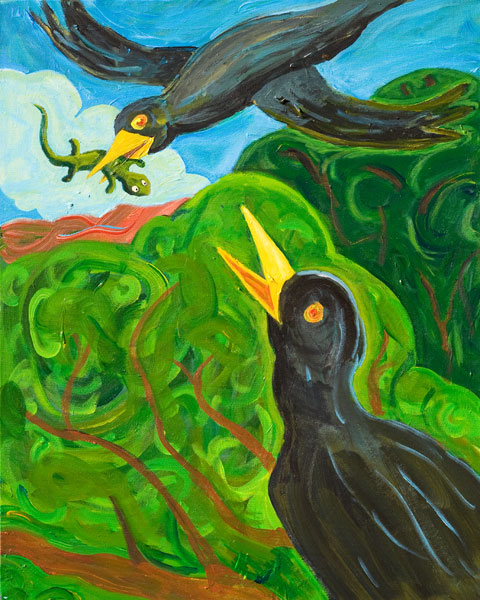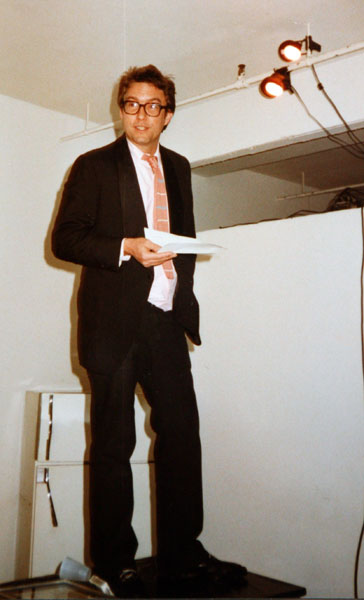More from my memoir-in-progress, Nested Scrolls.
In March of 1983, I got the Philip K. Dick award for Software. Sylvia and I flew up to New York City for the awards ceremony. Earlier that evening we had dinner with my editor Susan Allison, the editor David Hartwell, a writer friend of Phil’s called Ray Faraday Nelson, and the well-known writer Tom Disch—who was the one who’d initially proposed starting the award. Disch was a good guy, immensely hip and cultured.
Our whole party walked over to Times Square, where we saw Bladerunner, the brand-new movie based on Phil’s novel, Do Androids Dream of Electric Sheep. On the way over, I talked to Ray Nelson—he was such an in-the-moment guy that later in the evening when he had to make a speech, he just went over the things we’d talked about.

[I finished a new painting this week, it’s called Caw! Crows don’t actually have yellow beaks, but I think they look right. Check out the worried, astounded expression in that poor little lizard’s eyes.]
I liked the Bladerunner movie a lot, particularly the first part, with the blimps bearing electronic billboards, and the cop smoking pot while he interviewed the android, and the dark futuristic city with the neon lights glinting off pavements slick with rain. The last part of the movie seemed too violent, and inappropriately so, given that Phil’s Androids novel had largely been about empathy and peace. But that’s Hollywood.
“Phil would have loved it,” Ray Nelson reassured me. Actually, I’ve always wondered if Phil’s worrying about the movie in progress was what drove him to his fatal stroke—remember that the old phrase for stroke was “apoplectic fit.” (In the past, I’ve blogged about how I imagine Phil as a person .)

[Note the squirrel on the clothesline!]
The award ceremony was in an artist’s loft, with the hallways covered in reflective silver paint. One of the first people I ran into was my artist friend Barry Feldman from college. Incredibly, he was wearing a suit, and he looked more like Chico Marx than ever. He seemed just a bit envious of me getting an award—although he was a great painter, working all day long in his studio, he wasn’t breaking into the gallery scene. On a sudden whim, I told Barry he could pose as me and enjoy the fame.
As I was such an outsider to the SF scene, nobody knew what I looked like, and the substitution worked for about half an hour. Barry stood by the store shaking hands and signing books, twinkling with delight. I stood across the room, drinking and hanging out with Sylvia, Eddie Marritz, his wife Hanna, and Gerard Vanderleun, who’d edited The Fourth Dimension at Houghton-Mifflin. In the end it all got sorted out, and I met the people I needed to meet—among them was Susan Protter, who’d end up being my literary agent for the years to come.

Finally I stood on the bar at one end of the room and delivered a short speech that I’d composed on the plane, thinking about the Garbage King, a guy whom I’d met at Lynchburg party and had imagined to be the ghost of Phil Dick.
“If I say that Phil Dick is not really dead, then this is what I mean: He was such a powerful writer that his works exercise a sort of hypnotic force. Many of us have been Phil Dick for brief flashes, and these flashes will continue as long as there are readers. … I’d like to think that, on some level, Phil and I are just different instances of the same Platonic form—call it the gonzo-philosopher-SF-writer form, if you like. … If it is at all possible for a spirit to return from the dead, I would imagine that Phil would be the one to do it. Let’s keep our eyes open tonight, he may show up.”
The next day we went to visit Barry and his wife at his studio. I’d lifted a bottle of liquor from the awards ceremony to give him. He looked a little embarrassed. It turned out he’d bagged three bottles himself. (I wrote some more about all this in an essay “Haunted by Phil Dick”, which appeared in my collection of essays, Seek!.)

[I changed my earlier painting “Owl Creek” and gave it a new name, “A Fork in Time.” The picture represents more clearly than before the notion of someone going through a moment in time where the universe forks and in one branch they live and in the other they die.]
On Easter Day, 1989, I’d receive my second Philip K. Dick award—my third dick, you might say. It was for Wetware, my sequel to Software, and the ceremony was at a smallish regional SF con in Tacoma, Washington. It wasn’t like the artists’ loft in New York at all. It was in a windowless hotel ballroom with a dinner of rubber ham and mashed potatoes.
By then I was working a day job, and I didn’t have time to write as much as before, which had put me into a depressed state of mind. Winning the award, I felt like some ruined Fitzgerald character lolling on a luxury liner in the rain—his inheritance has finally come through, but it’s too late. He’s a broken man.

In my acceptance speech, I talked about why I’d dedicated Wetware to Phil Dick with a quote from Camus, “One must imagine Sisyphus happy.” I see Sisyphus as the god of writers or, for that matter, artists in general. You labor for months and years, rolling your thoughts and emotions into a great ball, inching it up to the mountain top. You let it go and—wheee! It’s gone. Nobody notices. And then Sisyphus walks down the mountain to start again.
In my speech, I read a little more from Camus’s “The Myth of Sisyphus”:
“Sisyphus, proletarian of the gods, powerless and rebellious, knows the whole extent of his wretched condition: it is what he thinks of during his descent. The lucidity that as to constitute his torture at the same time crowns his victory. There is no fate that cannot be surmounted by scorn.”
As so often happens, nobody got what I was talking about. One of the fans invited me to come to his room and shoot up with ketamine, an offer which I declined. Outside the weather was pearly gray, with uniformed high-school marching bands practicing for something in the empty streets.

But never mind all that ancient gloom! It’s a new world now. Happy Thanksgiving!









November 25th, 2008 at 2:17 pm
Disch was a great guy, sadly missed. OMG did he ever miss a great election! Did you know that PKD once turned him in to the FBI once he realized that CAMP CONCENTRATION was full of coded messages? Have a good Thanksgiving – you certainly have the family for it!
November 25th, 2008 at 4:02 pm
A critic about White Light, it’s published on Turkish Radikal Book Magazine in last year. Unfortunately it’s Turkish.
Best Regards.
Rudy Rucker (1946) Amerikalı bir matematikçi olarak Siberpunk akımının önde gelen isimlerinden biri. Uzun yıllar bilimsel kitaplar, kuramlar ve romanlar geliştirdi ve yazdı. 1983’te yazdığı Transrealist Manifesto ile Siberpunk kavramına yeni açılımlar getirken başta William Gibson gibi pek çok yazarı da etkilemiş oldu.
Transrealizmi bilimkurgu içinde ele alıyor ve onun avangard yönünü temsil ettiğini söylüyordu. Transreal romanlar gerçekliğin içinden geçerek onu yok etmeye yakmaya kadar ileri gidebilirlerdi. Zamanda yolculuk makineler aracılığıyla değil, zihinde; uçmak bir çeşit aydınlanmayla ve bedenin terk edilişiyle, telepati de iletişimin en doğru yolu olarak kullanılıyordu.
Karakterler gerçek insanlardan oluşmalı, standart kurmacalardaki yazarın iradesi altındaki kuklalara dönüşmemeliydi. Olaylar tahmin edilebilir olmalı ve diyaloglar karakterleri umduklarından daha fazla zorlamalıydı.
Bir Transrealist romanda yazar kitabı yazan roman kahramanı olarak ortaya çıkmalı, kendisinin idealize, paralize olmuş halleri romanda yer almalıdır. Bunlar asla süper kahramanlar değildirler; bizim onları bilebileceğimiz ve anlayabileceğimiz kadardırlar.
Transrealist sanatçı eserinin sonunu önceden tahmin edemez. Çünkü roman organik olarak büyümektedir. Ona dışarıdan yazarın müdahale etmesi beklenmez. Çünkü okur için tahmin edilebilir olan, her zaman ilgi yitimine uğrar. Transreal bir roman devrimci bir sanat formudur. Kitlelerin düşünce kontrolünü ve uzlaşılmış bir gerçeklik mitini yok sayar. Transrealizm bilimkurgu edebiyatının artistik bir yoludur.
Bütün bu koşullar düşünüldüğünde 1980’de yazılan Beyaz Işık’ın yeni bir roman türünü yarattığını söylemek yanlış olmayacaktır. Kahramanımız Felix Rayman tıpkı Rucker gibi SUCAS üniversitesinde araştırma görevlisidir ve uzun zamandır ünlü matematikçi Georg Cantor’un 1875’te keşfetmiş olduğu Süreklilik Problemi’ni düşünüyordur. Bir aylak, toplumsal yaşamın kıyısında bir alkolik oluşu, yaşayacağı tüm deneyimlerin kuşkuyla karşılanmasına neden olsa da, sonsuzluğun içine yaptığı yolculuk deneyimi tüm yaşamı kapsayan bir sonuca ulaşmasına neden olur. Dünyanın gizidir bu. Beyaz ışığın ne olduğunu anlamasına yarayan tek gerçektir.
Rayman başlangıçta problemi çözmek için tıpku Faust gibi ruhunu bile satmayı düşünür. Gerçekten de beyaz bir ışık kılığında gelir Şeytan, ama ardından İsa gelip de yolculuğa çıkasını buyurmasıyla astral bir yolculuğa çıkması zorunlu hale gelir.
Rayman bedenini bir ağacın altında terk eder ve sonsuzluğa doğru, bütün matematik problemlerini çözmek ve Tanrı’ya ulaşmak için harekete geçer. Astral bedeniyle birlikte ışık hızına yakalayan Rayman, çok geçmeden sonsuzluğu simgeleyen Alef sıfıra ulaşır. Burası Hilbert Oteli adında, dünyanın dışında bir arayüzeydir ve Tanrı’ya ulaşmak için bir bekleme noktasıdır. Ancak ne zaman ne de mekan bildik kalıplar içinde düşünülebilir. Burada da metematik dünyasının henüz çözülmemiş problemleri ve tanıdık yüzleri bulunmaktatır. Georg Cantor, David Hilbert ve Albert Einstein bir masada oturup, konuşurlar. Rayman’ın aralarına girmesi ve kimi teoriler hakkında bilgi edinmesi kaçınılmazdır.
Rayman’ın yeni hedefi Alef bire yapılacak bir yolculuktur. Bir rehbere gereksinir, ancak onlara ulaşması olası değildir. Ama Franx adında bir hamam böceği onun eşlikçisi olacaktır. Franx dev bir böcektir ve sürekli olarak Prag’daki yaşamdan söz eder. Aslında Rudy Rucker’in özel olarak ilgilendiği bididir Kafka ve hem Gregor hem de Kafka Franx karakteriyle romana girmiş olur. Gerçekten de Gregor’un talihsiz dönüşümünü Siberpunk açısından değerlendirdiğimizde, söz konusu edebiyatın ilk ve önemli arketiplerinden birine ulaşmış oluruz. Yalnınca Kafka değil, kimi zaman karşılaştığı problemleri yine janrın önemli isimleriyle çözmesi gözlerden kaçmaz. Stanislaw Lem’in romanları, Breugel’in tabloları, Donal Duck gibi çizgi film kahramanları da romanda önemli saflar tutmaktadır.
Romanın karmaşık yapısı ve sonsuzluğu, bitmek tükenmek bilmeyen mekan değişimleri ve görüngüleri; konuşan duvarları, elektrik direkleri ve arabalarıyla tam bir kaos ortamı gibi görünse de, her şeyin boyut değiştirdiği bir dünyada tek tek anlam kazanacaklardır.
Transreal romanın ilk örneği olan Beyaz Işık meselini ciddiye alırken, dünyanın klişeleriyle de alay etmeyi unutmuyor. Yer yer gülme krizleri eşliğinde sınırların ve bedenlerin ötesinde bir yaşama tanık olmak için Beyaz Işık bir kült roman ve sonsuzluğu ilgilendiren her teori onun kısıtlı olduğunu ileri süren bir başka teori tarafından sonlanır ve bu sonsuza kadar devam eder.
November 25th, 2008 at 4:14 pm
Happy Thanksgiving Rudy!
November 25th, 2008 at 5:19 pm
I recently bought the Blu-Ray 5 Disc box set of BladeRunner. It has 5 versions of the movie! Plus lots of extras. I thought I liked the original voice-over version the best, but this time around I preferred the “All New – Final Cut”. Of course the music by Vangelis really helps make this one of the best movies ever made.
November 25th, 2008 at 9:17 pm
The Sisyphus metaphor is nice. At the end of the struggle, whee!
November 25th, 2008 at 10:09 pm
Gobble Gödel Gobble!
November 26th, 2008 at 5:53 am
buna dimineata: how about a rumanian translation for Software of White Light!
November 26th, 2008 at 6:22 am
“…I’d receive my second Philip K. Dick award—my third dick, you might say. ”
aww, that’s terrible! You should be pun-ished…